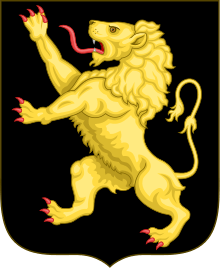Belgian Federal Parliament
The Belgian Federal Parliament is the bicameral parliament of Belgium. It consists of the Chamber of Representatives (Dutch: ![]()
![]()
Belgian Federal Parliament | |
|---|---|
 Emblem of the Senate | |
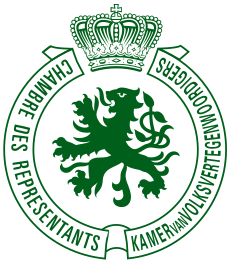 Emblem of the Chamber of Representatives | |
| Type | |
| Type | Bicameral (de facto unicameral) |
| Houses | Senate Chamber |
| Leadership | |
President of the Senate | |
President of the Chamber | |
| Structure | |
| Seats | 210 60 Senators 150 Representatives |
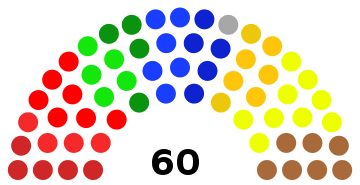 | |
Senate political groups | |
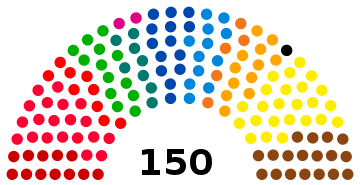 | |
Chamber political groups | |
| Elections | |
| Indirect election | |
| Open list proportional representation within eleven constituencies, with 5% constituency electoral thresholds | |
Chamber last election | May 26, 2019 |
| Meeting place | |
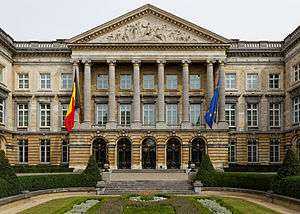 | |
| Palace of the Nation, Brussels | |
| Website | |
| www.fed-parl.be | |
The Constitution does not mention the Federal Parliament as such; it stipulates that the federal legislative power is exercised by the King and the Chamber of Representatives (and exceptionally the Senate), and defines when the United Chambers convene.
Chamber of Representatives
The Chamber of Representatives holds its plenary meetings in the Palace of the Nation, Brussels. Eligibility requirements for the Chamber are a minimum age of 21, citizenship, and residency in Belgium.
The number of seats in the Chamber is constitutionally set at 150 elected from 11 electoral districts. The districts are divided along linguistic lines: 5 Flemish (79 seats), 5 Walloon (49 seats), and the bilingual district of Brussels-Halle-Vilvoorde (22 seats). The districts are the provinces, except for the districts of Leuven (part of Flemish Brabant) and Brussels-Halle-Vilvoorde. Each district is given a number of seats proportional to its population (not number of voters) ranging from 4 for Luxembourg to 24 for Antwerp. All districts have an electoral threshold of 5%, except for Brussels-Halle-Vilvoorde and Leuven; all districts are monolingual, except for Brussels-Halle-Vilvoorde which encompasses both the 19 bilingual municipalities from the Brussels-Capital region and some 35 Dutch-speaking municipalities in Flemish Brabant, incl. 7 with language facilities for French-speakers.
The current composition was elected at the federal elections of 2019.
| |||||||||||
| Party | Leader(s) | Votes | % | +/– | Seats | +/– | |||||
|---|---|---|---|---|---|---|---|---|---|---|---|
| New Flemish Alliance (N-VA) | Bart De Wever | 1,086,787 | 16.03 | 4.23 |
25 / 150 |
8 | |||||
| Flemish Interest (VB) | Tom Van Grieken | 810,177 | 11.95 | 8.28 |
18 / 150 |
15 | |||||
| Socialist Party (PS) | Paul Magnette | 641,623 | 9.46 | 2.21 |
20 / 150 |
3 | |||||
| Christian Democratic & Flemish (CD&V) | Joachim Coens | 602,520 | 8.89 | 2.72 |
12 / 150 |
6 | |||||
| Workers' Party of Belgium (PVDA-PTB) | Peter Mertens | 584,621 | 8.62 | 4.90 |
12 / 150 |
10 | |||||
| Open Flemish Liberals and Democrats (Open VLD) | Egbert Lachaert | 579,334 | 8.54 | 1.24 |
12 / 150 |
2 | |||||
| Reformist Movement (MR) | George-Louis Bouchez | 512,825 | 7.56 | 2.08 |
14 / 150 |
6 | |||||
| Socialist Party Differently (sp.a) | Conner Rousseau | 455,034 | 6.71 | 2.12 |
9 / 150 |
4 | |||||
| Ecolo | Jean-Marc Nollet Zakia Khattabi |
416,452 | 6.14 | 2.84 |
13 / 150 |
7 | |||||
| Green (Groen) | Meyrem Almaci | 413,836 | 6.10 | 0.78 |
8 / 150 |
2 | |||||
| Humanist Democratic Centre (cdH) | Maxime Prévot | 250,861 | 3.70 | 1.28 |
5 / 150 |
4 | |||||
| Democratic, Federalist, Independent (DéFI) | Olivier Maingain | 150,394 | 2.22 | 0.42 |
2 / 150 |
0 | |||||
| People's Party (PP) | Mischaël Modrikamen | 75,096 | 1.11 | 0.41 |
0 / 150 |
1 | |||||
| DierAnimal | Constance Villalon | 47,733 | 0.70 | New | 0 / 150 |
0 | |||||
| Listes Destexhe | Alain Destexhe | 42,712 | 0.63 | New | 0 / 150 |
0 | |||||
| Collectif Citoyen | 21,092 | 0.31 | New | 0 / 150 |
0 | ||||||
| La Droite | 15,075 | 0.22 | 0.16 |
0 / 150 |
0 | ||||||
| Nation | Hervé Van Laethem | 10,583 | 0.16 | 0.00 |
0 / 150 |
0 | |||||
| Les Belges d'Abord | 10,463 | 0.15 | New | 0 / 150 |
0 | ||||||
| Agir | 7,598 | 0.11 | New | 0 / 150 |
0 | ||||||
| Pirate Party | 7,521 | 0.11 | 0.23 |
0 / 150 |
0 | ||||||
| Belgian Union (BUB) | Hans Van De Cauter | 6,611 | 0.10 | 0.08 |
0 / 150 |
0 | |||||
| D-SA | 5,949 | 0.09 | New | 0 / 150 |
0 | ||||||
| Lutte Ouvrière | 5,735 | 0.08 | 0.03 |
0 / 150 |
0 | ||||||
| PRO | 5,682 | 0.08 | New | 0 / 150 |
0 | ||||||
| Wallonie Insoumise | 5,354 | 0.08 | New | 0 / 150 |
0 | ||||||
| PV&S | 3,217 | 0.05 | New | 0 / 150 |
0 | ||||||
| De Coöperatie | 1,732 | 0.03 | New | 0 / 150 |
0 | ||||||
| Volt Europa (Volt) | 1,669 | 0.02 | New | 0 / 150 |
0 | ||||||
| Communist Party of Belgium (PCB) | Arne Baillière | 1,626 | 0.02 | New | 0 / 150 |
0 | |||||
| Turquoise | 626 | 0.01 | New | 0 / 150 |
0 | ||||||
| Valid votes | 6,780,538 | 93.93 | |||||||||
| Blank and invalid votes | 438,095 | 6.07 | |||||||||
| Totals | 7,218,633 | 100.00 | — | 150 | 0 | ||||||
| Electorate (eligible voters) and voter turnout | 8,167,709 | 88.38 | |||||||||
| Source: Federal Public Services Home Affairs | |||||||||||
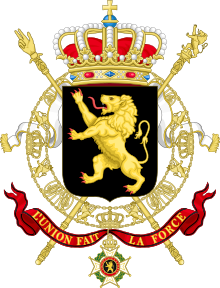 |
|---|
| This article is part of a series on the politics and government of Belgium |
|
|
|
|
Federal Cabinet |
|
|
Senate
Since 2014, the Senate consists of 60 members. There are two categories of senators: co-opted senators and senators of community and regional parliaments.
50 senators are elected by and from the community and regional parliaments: 29 by the Flemish Parliament, 10 by the Parliament of the French Community, 8 by the Walloon Parliament, 2 by the French-language group of the Parliament of the Brussels-Capital Region, and 1 by the Parliament of the German-speaking Community.
The 10 other senators are co-opted: elected by the 50 other senators. Eligibility requirements for the Senate are identical to those for the Chamber.
Before 2014, the Senate consisted of 71 senators, only 21 of which were elected by the community parliaments. 25 were directly elected by the Flemish-speaking constituency and 15 by the French-speaking constituency. The last direct election of these 40 members occurred in the 2010 federal elections. The 2014 elections are the first one with the reformed Senate.
The President of the Senate since 2014 has been Christine Defraigne (MR). The Senate holds its plenary meetings in the Palace of the Nation, Brussels.
Legislative procedure
Since the elections of 21 May 1995, there has been a breakdown of powers between the Chamber of Representatives and the Senate, which resulted in the latter having fewer competences than the Chamber of Representatives. Prior to that, the Chamber of Representatives and the Senate did the same parliamentary work on an equal footing, but now there are three different legislative procedures that can be followed: the one-chamber procedure, the optional two-chamber procedure, and the mandatory two-chamber procedure.
In certain matters both Chambers have equal power. These include constitutional revisions, laws requiring a qualified majority, laws on the basic structure of the Belgian State, laws approving agreements of cooperation between the Federal State, the Communities and the Regions, laws on the approval of international treaties, and laws on the organisation of the judiciary, the Council of State, and the Constitutional Court. In this case, the mandatory bicameral procedure applies, which means that both Chambers must pass exactly the same version of the bill.
For most other legislation, the Chamber of Representatives takes precedence over the Senate and the optional bicameral procedure applies. This means that the Senate may still intervene as a chamber of consideration and reflection. It has the opportunity to, within specific time limits, examine the bills adopted by the Chamber of Representatives and, if there is a reason to do so, make amendments. The Chamber may subsequently adopt or reject the amendments proposed by the Senate or make new proposals. The Senate can also submit a bill it has adopted to the Chamber, which can approve, reject or amend it. Whatever the case, the Chamber has the final word.
The one-chamber procedure applies in cases where the Chamber of Representatives has the sole power to legislate. It means that the Senate cannot intervene and that the Senate's approval is not required for the bill to pass. The matters for which the Chamber of Representatives is exclusively responsible include naturalisations, ministerial liability, State budget and accounts and military quotas.
United Chambers
The United Chambers (Dutch: Verenigde Kamers, French: Chambres réunies, German: Vereinigten Kammern) is the name given to the body created when both chambers of the Federal Parliament meet in joint session. The United Chambers are convened only on certain occasions enumerated in the Belgian Constitution: the King must take the constitutional oath before the United Chambers, in accordance with article 91 of the Constitution, and the United Chambers must provide for the regency in the event that the successor to the Crown is a minor or the King is unable to reign, in accordance with articles 92 and 93 of the Constitution. The last session of the United Chambers took place on 21 July 2013, when King Philippe of Belgium took the constitutional oath.[1]
Palace of the Nation
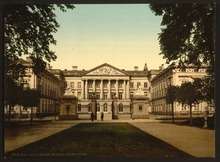
The Palace of the Nation (French: Palais de la Nation; Dutch: Paleis der Natie) was built to a Neoclassical design by French architect Gilles-Barnabé Guimard from 1779 to 1783 and includes sculptures by Gilles-Lambert Godecharle. Under Austrian rule it housed the Sovereign Council of Brabant before being used as a courthouse during the French period. During the Dutch period it was one of two homes of the Parliament of the United Kingdom of the Netherlands, the other being in the Hague. The provisional Government of Belgium and the Belgian National Congress moved into the building in 1830 and the first session of the House of Representatives and Senate was held there a year later.
It stands near the site of the former palace of the Dukes of Brabant, which was destroyed by fire in 1731, and has itself been badly damaged by fire, in 1820 and 1883.[2]
See also
- Politics of Belgium
- Court of Audit of Belgium
- List of political parties in Belgium
- Brussels Parliament
- Flemish Parliament
- Commission communautaire française
- Parliament of the German-speaking Community
- Vlaamse Gemeenschapscommissie
- Walloon Parliament
- Parliament of the French Community
- List of legislatures by country
References
- The Chamber of Representatives and the Senate of Belgium. "Solemn session of the United Chambers of Monday 9 August 1993 for hearing the constitutional oath of H.M. Albert II, King of the Belgians" (PDF). Minutes of the United Chambers (in French and Dutch). The Belgian Chamber of Representatives. Archived from the original (PDF) on 3 December 2007. Retrieved 2007-11-17.
- "Palace Of The Nation - Belgian Federal Parliament on EarthInPictures.com". www.earthinpictures.com.
